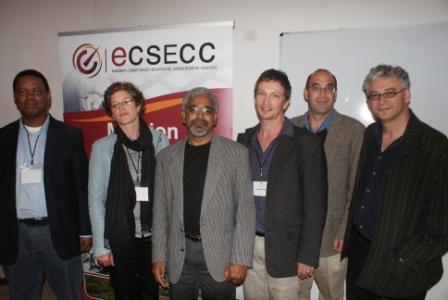
The challenges that are facing comprehensive health care for all in South Africa, in particular emerging proposals for National Health Insurance, and the need to speed up the process of health reform were revisited during a colloquium organised by Rhodes University's Institute of Social and Economic Research (ISER) and Eastern Cape Socio-Economic Consultative Council (ECSECC) last week.
Professor Greg Ruiters, director of the Insitute for Social and Economic Research (ISER) welcomed participants to the colloquium who included leading academic researchers from the University of Cape Town, the University of Western Cape and the University of Oxford, representatives of the SA Medical Association, the Health Professionals Council, the Health Systems Trust and civil society advocacy groups such as the Black Sash. Postgraduate students interested in social policy from the Department of Politics and Pharmacy also attended the one-day colloquium.
Robert van Niekerk, Professor of Social Policy, kick-started the colloquium by reflecting and highlighting efforts to address health issues during the segregation, apartheid and democratic periods in South Africa. He examined key historical documents such as African Claims, the Freedom Charter and the RDP “base document” and argued that these reflected a social democratic vision for health care reform based on a National Health Service (NHS).
He further argued that the most far-reaching vision for health care reform was the recommendations of the Gluckmann Commission on a NHS - a government commission of the 1940s which recommended the establishment of a non-racial, socialised health care service based on community health centres.
Both African Claims by the African National Congress, and the proposals of the Gluckmann Commission for a National Health Service (NHS) were rejected by General Jan Smuts' United Party government. These historical lessons were compared with the experiences of health reform in Britain since 1948 when the NHS was founded by Clement Attlee’s Labour government which came into power on a landslide majority.
Dr Rebecca Surender of the University of Oxford argued that the attempts to reform the UK NHS towards market-based principles in the 1980s could not be explained by fiscal reasons alone, as the NHS was the most cost-effective system of health care provision in Europe. It was rather the ideological policy agenda of the Margaret Thatcher Conservative government that was a key factor driving the reform agenda. Politics will thus crucially matter in effecting health policy reform.
The implementation of universal health care is in the agenda of the World Health Organisation. Dr Siva Pillay, the head of the Eastern Cape health department, said the matter is non-negotiable. "We should then be asking ourselves, is the whole world wrong and we are right?" Pillay continued, "We should now be debating how and when we should be doing it, and not whether we should do it or not."
Other than the political will, finance and technology, the country's progressive Constitution is seen as a major obstacle. Professor David Sanders of the University of the Western Cape made the issue clear when he said, "We have the instrument - but who is wielding it is another matter".
According to Maylene Shun-King, the most concerning issue was the unnecessary deaths of children. Many die of preventative conditions, despite the many institutions and policies that look after their rights and welfare.
Professor Lucy Gilson was more concerned with the ongoing opposition to change. She encouraged opening the debate with different teams and managing their diverse interests by ensuring that evidence-based information is made available. She hopes for a strong alliance which can engage opposition to health care reform.
According to Professor Di McIntyre of the University of Cape Town comprehensive universal access to health care needs all South Africans to contribute according to their affordability, while benefitting according to their needs. So far, a lot of money goes to private hospitals and medical aid schemes. This inequitably benefits 16% of the population only, served by the 70% of health practitioners. Only the remaining 30% of doctors are in the public sector.
Speaker after speaker agreed on the necessity to educate and mobilise citizens to improve the health and well-being of every South African. Andrew Murray from ECSECC encouraged all present to join forces as a forum and initiate a campaign for universal access. A representative of the South African Communist Party who attended the colloquium went further and vowed to take this matter up in its Red October campaign, 2010.
